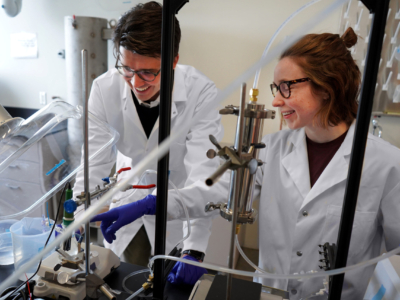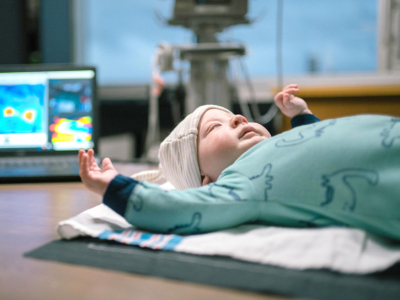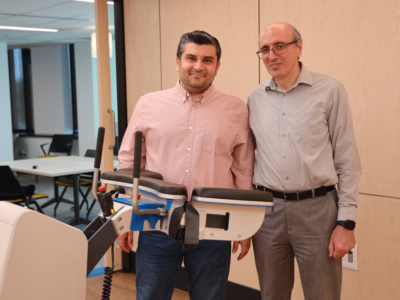
Suzan Bsat developed Mo-Billing to simply medical billing using a mobile app.
As a biomedical and mechanical engineering student, Suzan Bsat didn’t expect her undergrad courses on computer programming to be put to much use. Then she applied for a contract job as a computer programmer while working on her master’s degree, and her life changed.
“A professor at the University of Ottawa wanted someone to spend a few weeks designing an app for his personal use. He was annoyed by the manual billing process he used to get paid by the Ministry of Health and he wanted to automate his billing with an app,” says Bsat of the temporary job.
Dr. Pil Joo was so impressed by the time-saving results, he suggested Bsat could turn the app into a commercial product. The pair launched Mo-Billing, a web and mobile application for paperless collection, storage, delivery and retrieval of medical billing data, in January 2014
Now vice-president of a company, Bsat is still working toward her Master of Applied Science degree in biomedical engineering. When she’s not in the lab at Carleton investigating the surgical treatment of femoroacetabular impingement hip disease with supervisor Dr. Hanspeter Frei, she’s pitching her product to medical billing agents.
“Starting a company as a student is the best time: everyone wants to help you succeed. There are programs to help young entrepreneurs to get started, government incentives and grants,” says Bsat. “And being busy all the time seems normal for engineering students. The excitement and momentum just keeps you going.”
Bsat credits programs at Carleton for developing the technical and soft skills she needs to succeed.
“In the early courses in engineering, I felt I was learning general material, but it was the foundation for everything to come. I learned programming, which allowed me to branch into app development. I also learned the importance of communication. What good is an idea if no one knows what it is?”
“I was given the chance to be a teaching assistant in the communication course,” Bsat says. “Through teaching, I learned to be flexible, adaptable and creative.”
“I also had professors who had my best interests in mind. I was able to partner with Professor Huang on a research project and she gave me the chance to publish and present at a conference. That ability to make a pitch for research in three paragraphs translated directly to business, where I have minutes to sell my idea.”
Bsat has been busy pitching Mo-Billing to billing agents in the GTA. The app is free to download from iTunes and GooglePlay, but billing agents purchase the software to process the app data.
Since doctors and specialists working in hospitals don’t usually have access to the electronic medical record (EMR) system used by clinics and private practices, many doctors jot down billing codes on slips of paper as they rush from one patient to the next. If they haven’t misplaced them, doctors then pass on those slips to their billing agents who prepare the paperwork to be submitted to provincial government for payment. Mo-Billing eliminates the need to fax, scan, email or drop off the billing information. Instead, the data is submitted electronically and immediately to the billing agent.
“New resident doctors are all on mobile devices,” says Bsat, “and we’ve seen how EMR has improved efficiency. Now we can offer ‘solo’ doctors the same convenience and data security.”
“It’s a challenge balancing a master’s degree and a business,” says Bsat, “but this is within my reach. Often as students, we don’t realize how much we can accomplish.”

Suzan Bsat investigates surgical treatment of femoroacetabular impingement hip disease.



